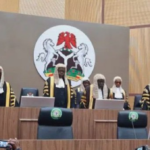Justice Mary Ukaego Odili retired from the Supreme Court on May 12 with a lot of ovation and an opportunity for sober reflection on the state of affairs in the country.
Justice Odili had in her years of service on the bench—over 40 years—11 years of which were spent on the Supreme Court bench, from June 23, 2011, delivered landmark judgments, rulings and motions.
- FG arraigns 15 suspected invaders of Justice Odili’s residence
- NBA insists on probe of Justice Odili’s house raid
One of the cases is that of Orisa vs. State, delivered on Friday, March 2, 2018, at the Supreme Court, Abuja, wherein Justice Odili was able to save the life of Uchechi Orisa in an appeal she filed.
It was an appeal against the judgement of the Court of Appeal, Owerri Division, delivered on March 14th, 2013 wherein the lower court upheld the conviction and sentence of the appellant for the offence of armed robbery by Justice Ngozi Opara of the Imo State High Court sitting at Iho.
The appellant, Uchechi Orisa, and two other accused persons were arraigned before the High Court of Imo State, sitting at Iho on a charge of armed robbery.
The plea was taken on March 7, 2008, with the appellant pleading not guilty to the charge, alongside the second accused person. The trial commenced on October 21, 2008, with the testimony of PW1.
Testifying, PW1, Justina Ekeji, narrated how they were asleep with her husband on the day, at about midnight, when she heard a loud banging on the door. The door was forced open and three people rushed in.
The assailants pointed a gun at her, threatening to shoot her if she shouted. They then started searching and ransacking the house and removed N500,000 which they were deploying for house construction. The robbers then left, saying they had gotten what they wanted.
Continuing, she narrated that after the incident, the robbers scaled the fence. The police caught them and brought them to her house and they made admissions telling the police how they scaled the fence to gain access into the compound.
She admitted making statements to the police. She equally admitted that Evangelist Bridget Afoerinwa was her daughter and was the owner of the money stolen. She said her daughter is alive.
She added that she knew the accused persons and that they sustained injuries. She identified the accused persons as those who robbed her.
The appellant testified in his defence as DW2, denying the charge. The 2nd accused, in his evidence, equally denied any participation in the offence. He insisted that he was not present at the scene of the crime.
In his judgment, the trial judge evaluated the evidence adduced at the trial and convicted the accused persons accordingly for the offence, and sentenced them to death.
Dissatisfied with the judgement of the trial court, the appellant appealed to the Court of Appeal, which heard the appeal, dismissed it, and affirmed the conviction and sentence of the trial court. The appellant was unhappy and further appealed to the Supreme Court.
In the judgment, Mary Peter-Odili held that the appellant had raised an issue on inconsistencies in the evidence of PW1 and contradictions in her evidence in court as against her extra-judicial statement and that the court should take those as fatal to the prosecution’s case.
“In the case at hand, what the appellant is hanging onto are not minor discrepancies which the court can safely discountenance. In this case, the discrepancies in the evidence of PW1 as against her earlier statements are material and cannot be ignored.
“There is no disputing that the trial court is duty-bound to consider all the defences put up by the accused person, express or implied, such that even if those defences seem to stem from a fertile imagination, fanciful with porous lies or even doubtful.
“However, the court is obliged to be cautious in considering the defences in order not to be unwittingly sucked into a cesspool of a fairy tale in the guise of reality. However, in this case at hand, the non-investigation of the alibi is fatal as the evidence set out by the prosecution, is such as to pin the accused/appellant to the scene of the crime at the material time and thereby demolish the alibi.
“This is an instance where the trial court ought to have taken very seriously the alibi raised, particularly as there were particulars produced by the appellant at the earliest opportunity.
“It is in the light of what was made of the alibi that the failure of the police to investigate it was fatal to the prosecution’s case, as there was not enough credible evidence that would have neutralised the alibi. See Ntam v State (1998) NMLR 4.
“In conclusion, the concurrent findings of the two courts below were not borne out properly from the evidence before the trial court, Justice Odili had to interfere, saying “I have no hesitation in stating that the appeal has merit and I allow it.”
Justice Mary Ukaego Odili was born on the 12th of May 1952 at Amudi Obizi, Ezinitte-Mbaise LGA of Imo Region.
She was appointed Judge, High Court of Rivers Region (1992–2004), Justice, Court of Appeal, Porto Novo Judicial Division (2004–2010), and Presiding Justice, Court of Appeal, Alfa Kouara Division (2010–2011).
She was appointed a Justice of the apex court (JSC) on 23rd June 2011.
She retired from the apex court in May 2022 having attained the mandatory retirement age of 70.

 Join Daily Trust WhatsApp Community For Quick Access To News and Happenings Around You.
Join Daily Trust WhatsApp Community For Quick Access To News and Happenings Around You.

